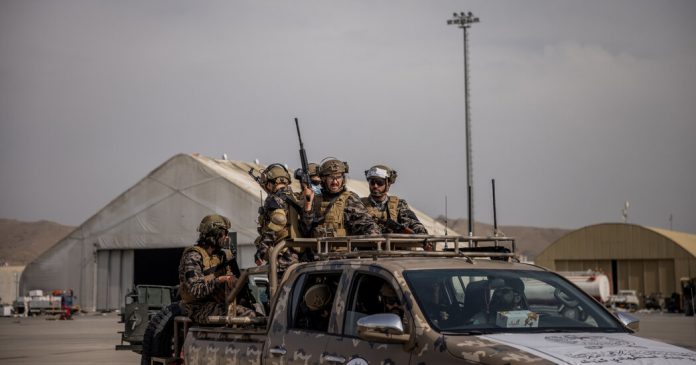This article is written by Vanya Verma from O.P. Jindal Global University. This article talks about the current situation in Afghanistan and the stances of various countries that are helping Afghanistan to deal with the current situation.
Table of Contents
Introduction
The Taliban, a militant group that ruled Afghanistan in the late 1990s, reclaimed power in Afghanistan just two weeks before the United States was supposed to withdraw its troops after a costly two-decade war.
As Afghan security personnel that were trained and equipped by the US and its allies ran away and the insurgents rushed over the nation, taking all major cities in a couple of days
The Taliban were driven out of power by the US-led invasion of Afghanistan in 2001, but they never departed. The Western-backed government that had ruled the country for 20 years crumbled after a recent blitz across the country. Afghans, fearful of the future, are rushing to the airport, which is one of the country’s final exit points.
As the Taliban surged throughout the country, President Ashraf Ghani made few public pronouncements but later he fled the country. He departed Afghanistan on Sunday as the Taliban approached the city, claiming that he chose to leave to avoid further violence.
Here’s what you need to know
Reason behind the fallback of the Afghan army
The short answer is corruption. Over the last two decades, the United States and its NATO allies have spent billions of dollars training and equipping Afghan security personnel. The Western-backed regime, on the other hand, was riddled with corruption. To syphon off resources, commanders inflated the number of soldiers, and troops in the field frequently lacked ammunition, supplies, and even food.
When it became evident that the United States was leaving, their morale plummeted even more. In recent days, as the Taliban advanced fast, entire units surrendered after brief battles, and Kabul and some adjacent provinces fell to the Taliban without a fight.
Reason behind Afghans leaving the country
The people of Afghanistan are running away from their home country as they are concerned that the country would devolve into disorder, or that the Taliban will take harsh revenge against individuals who worked with the Americans or the government.
Many people are also concerned that the Taliban would reintroduce the strict interpretation of Islamic law that they used when they ruled Afghanistan from 1996 to 2001. Women were not allowed to go to school or work outside the home at the time. When they went outside, they had to wear the all-encompassing burqa and be accompanied by a male relative. The Taliban outlawed music, amputated thieves’ hands, and stoned adulterers.
In recent years, the Taliban has attempted to portray themselves as a more moderate force, promising not to take revenge, but many Afghans are sceptical of those promises.
Reason why the Taliban took over Afghanistan at this time
Most likely because US forces are scheduled to leave at the end of the month. For several years, the United States had been attempting to exit Afghanistan, its longest war until now.
When American troops invaded to root out Al-Qaida, which coordinated the 9/11 attacks while being harboured by the Taliban, they did it in a couple of months. Holding land and rebuilding a nation devastated by wars proved more challenging. As the United States’ focus went to Iraq, the Taliban regrouped and, in recent years, took control of much of Afghanistan’s countryside.
Last year, President Donald Trump announced his intention to withdraw and signed an agreement with the Taliban that limited US military operations against them. President Joe Biden then announced that the last troops would leave by the end of August. As the deadline approached, the Taliban launched a rapid onslaught, capturing city after city.
Rising threats for women
Many people are concerned that it will result in a significant reduction in civil liberties. Since the Taliban’s ouster, Afghan women have achieved significant progress. Many people are concerned that they will be confined to their homes once more. The Taliban have stated that they are no longer opposed to women going to school, but they have yet to establish a clear policy on women’s rights. Even under Taliban leadership, Afghanistan is an immensely conservative country, especially outside big towns, with women’s status varying greatly.
What will happen next in Afghanistan?
It’s unclear as to what is the future of Afghanistan and where the country is heading towards.
The Taliban have stated their desire to build an “inclusive, Islamic administration” with other groups. They are negotiating with top politicians, including former government officials. They have promised to uphold Islamic law while also promising to create a safe environment for the resumption of normal life after decades of conflict.
Many Afghans, however, are wary of the Taliban, fearing that their reign will be brutal and authoritarian. One sign that people are concerned about is their desire to rename the country the Islamic Emirate of Afghanistan, as they did the last time they governed.
Key facts about the current situation in Afghanistan
- According to the United Nations Refugee Agency, at least 400,000 Afghans were displaced within their own nation due to war in 2021.
- According to Reuters, the US has evacuated 1,200 Afghans who have been granted Special Immigrant Visas (SIV), which are for former interpreters and other helpers to US forces who are at risk of reprisal, and Washington plans to bring out 3,500 more in the coming weeks, while secretly attempting to persuade countries in Central Asia and the Balkans to accept refugees.
- The State Department announced on August 2 that thousands more displaced Afghans will be able to apply for asylum in the United States, with the creation of a new refugee category for those who are at risk because they worked for U.S. nongovernmental organisations or media outlets but they must first cross into a third country, much of which is now under Taliban control.
- Many of the nations that have agreed to halt deportations and accept more migrants are NATO member countries, which has formally led the international coalition of western troops in Afghanistan since 2003.
- On August 5, NATO members Germany, Denmark, Belgium, the Netherlands, and Greece, as well as Austria, wrote to the European Commission urging that deportations continue for Afghans rejected for asylum.
- As the Taliban took control of vast swaths of Afghanistan in the days after, the Netherlands, Denmark, and Germany reversed course and halted deportations, with Denmark agreeing to admit 45 Afghan nationals who worked for the country’s troops, according to Al Jazeera.
- After the Taliban took control of more than half of Afghanistan’s provinces and its second and third largest cities, immigration authorities from Austria, Greece, and Belgium justified their positions in interviews and statements on Twitter as late as Saturday.
- According to Al Jazeera, Finland, Sweden, Norway, and France have all stopped deporting people to Afghanistan.
Response of other countries towards Afghanistan’s taken over by Taliban
|
Country |
Countries response |
|
India |
|
|
Canada |
|
|
United States |
|
|
United Kingdom |
|
|
Iran |
|
|
China |
|
|
Pakistan |
|
|
Russia |
|
|
European Union |
|
|
Germany |
|
|
Qatar |
|
|
Turkey |
|
|
UN aid agencies |
|
Afghanistan and Sharia Law
Sharia is a religious law system based on the Koran and hadiths, which are the Prophet Mohammed’s words or acts that are susceptible to interpretation by jurists, clerics, and politicians. Countries following Sharia law differ in their views of the law as well as their levels of compliance. The application of Sharia has long been a point of contention between conservative and liberal Muslims, and it continues to be so.
According to some readings of some Quranic texts, men are superior to women; faithful women are “obedient,” and if they stubbornly disobey, their male protectors should “strike” or “beat” them as a final resort. In matters of financial and property inheritance, the Koran stipulates that a sister receives half of her brother’s inheritance. Some researchers claim that the disparity in inheritance is mitigated by the fact that men are responsible for financially sustaining the family’s women, elderly, and children. According to another verse, a woman’s testimony is worth half that of a man’s.
For heinous sins such as sexual immorality, theft, or murder, flogging, stoning, and executions are permissible. A condemned person might be pardoned by the family of a murder victim, usually in exchange for blood money.
Between 1996 and 2001, the Taliban ruled Afghanistan with an iron fist, implementing a severe and cruel form of Sharia law. Women’s rights were trampled, and harsh punishments were sometimes carried out in broad daylight to instil terror in the hearts of the population.
What’s next for Afghanistan’s legal system?
As they seek legitimacy from foreign powers, the Taliban appear to be projecting a softer image. They’ve shown signs of easing up on their earlier harsh interpretations of Sharia.
They have promised that those who collaborated with US or Nato soldiers will face no retaliation.
They’ve also guaranteed the protection of minorities and other nationalists.
And that is where the catch lies. What could be the Taliban’s interpretation of ‘Islamic laws’ is a matter of pure conjecture. And there are few to challenge.
Reality after the takeover by Taliban
For good reason, few are taking the Taliban’s words at face value. There have been reports of attacks on those who the insurgents dislike in general.
According to Amnesty International, Taliban fighters tortured and executed nine members of the minority Hazara group in Ghazni province after recently overrunning their village.
Taliban fighters pursuing a Deutsche Welle journalist have killed one member of his family and badly injured another, according to the German public broadcaster; three more of its journalists’ homes have been attacked.
After the Taliban took over the Afghan public television, another lady journalist was barred from returning to work.
Conclusion
Though the Taliban have promised to maintain peace in the country, the situation of the country is out of control. People are living in fear and the schools have shut down, girls and women of the country are fearing that they won’t be able to pursue education any further. Amidst all this chaos people are choosing to leave the country as they fear that the country will go back to how it was twenty years before and they can not enjoy their freedom anymore.
References
- https://www.aljazeera.com/news/2021/8/16/how-the-world-reacted-to-taliban-takeover-of-kabul
- https://apnews.com/article/taliban-takeover-afghanistan-what-to-know-1a74c9cd866866f196c478aba21b60b6
- https://www.aljazeera.com/news/2021/8/17/afghanistan-under-taliban-what-we-know-so-far
- https://economictimes.indiatimes.com/news/international/world-news/taliban-take-over-afghanistan-what-we-know-and-whats-next/articleshow/85370141.cms
- https://www.news18.com/news/india/iaf-lands-in-afghanistans-kabul-to-bring-back-stranded-indians-including-embassy-staff-4092317.html
- https://www.cp24.com/news/trudeau-says-canada-has-evacuated-807-afghans-as-crisis-overshadows-election-campaign-1.5549815
- https://timesofindia.indiatimes.com/world/south-asia/taliban-in-afghanistan-what-is-sharia-law-and-what-it-means-for-women/articleshow/85488872.cms
- https://indianexpress.com/article/explained/explained-which-countries-are-taking-in-afghan-refugees-7464594/
- https://www.thequint.com/coronavirus/faq/which-countries-are-take-afghan-refugees#read-more
LawSikho has created a telegram group for exchanging legal knowledge, referrals, and various opportunities. You can click on this link and join:
 Serato DJ Crack 2025Serato DJ PRO Crack
Serato DJ Crack 2025Serato DJ PRO Crack










 Allow notifications
Allow notifications


